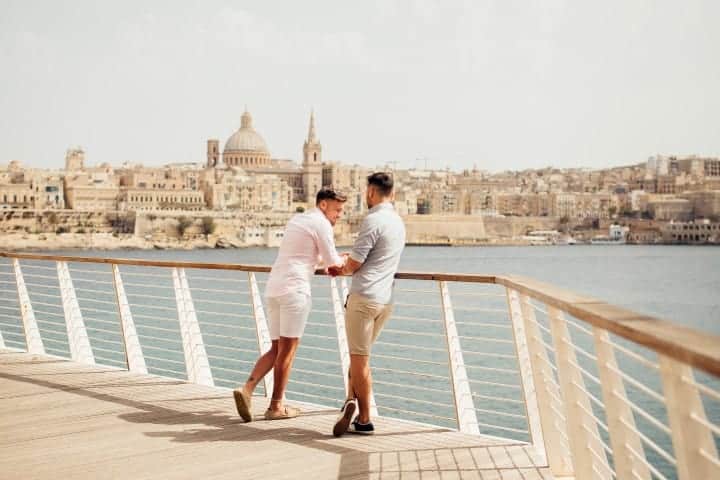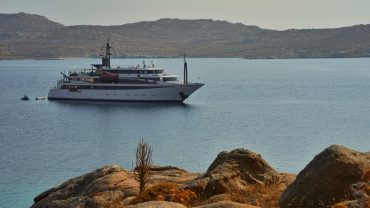Within the past decade, LGBTQ+ acceptance and same-sex marriage have gained momentum around the world, and there are now 38 countries with full marriage equality. For LGBTQ+ travelers, safety and comfort are important considerations when choosing a destination. Sadly, there are still some 70 countries worldwide where LGBTQ+ people face legal obstacles as visitors—some more severe than others.
For those looking for an LGBTQ+-friendly option in a European destination, ILGA-Europe publishes a annuel report as well as a rainbow map revealing the top European countries that afford their citizens and visitors the most extensive LGBTQ+ rights and protections. Since the report in 2020, there have been many changes—some for the better and some for the worse. Sadly, the UK slipped from the top ten all the way down to 16h place. Spain, however, has jumped six places to number four, while Finland entered the top ten, and Greece moved up four places. The report also notes that once-leading countries in Europe are still falling behind in their commitments to equality for LGBTQ+ people, but despite intense anti-LGBTI attacks in several countries, equality is still advancing. Albeit slowly!
Although this metric isn’t the only reason to choose a destination, it’s certainly one of the considerations many LGBTQ+ travelers use. These places are some of the most beautiful countries in Europe; plus, they all have amazing things to discover, and you’ll have a much greater opportunity to be yourself and not fear harassment or discrimination because of your sexual orientation.
Curious where a country ranks on the list? Click here to view the 2020 index.
Spain
On June 30, 2005, same-sex marriage was legalized in Spain—3rd in line after the Netherlands and Belgium. If you’re planning a visit, destinations like Barcelona and Madrid have fantastic nightlife scenes. For a beachy atmosphere, the Canary Islands provide an array of activities, resorts, unique events, and an incredibly accepting culture. Events like Maspalomas Gay Pride in May or the Winter Pride in November have attracted many gay and lesbian tourists, and the islands’ LGBTQ+ support has created a lucrative, accommodating culture for both single and couple travelers. Year-round, subtropical climates are a Canary Islands cornerstone, and the charming towns exemplify the area’s comfortable and relaxing atmosphere.
Finland
Finland is an exceptional travel destination and one of the world’s best countries to witness the Northern Lights. During the day, the endless countryside is blanketed in snow and peppered with frozen lakes. At night, the sky is an eruption of light and color as the Aurora Borealis enthralls. Chances are that if you’re visiting Finland, you’ll also be spending some time in Helsinki, the capital city. One interesting activity in Helsinki is the Tom of Finland walking tour. The experience begins with an audio-visual introduction to Touko Valio Laaksonen, a.k.a. the famed erotic artist better known as Tom of Finland. After the introduction, a local guide leads you through the streets of Helsinki, discovering everything from Tom’s local watering hole to his preferred cruising park.
Norway
Norway has some of the most epic and varied natural landscapes found in Europe. The country is known for its stunning and majestic fjords, which are towering cliffs overlooking the ocean, carved by retreating glaciers tens of thousands of years ago. Spectacular waterfalls, breathtaking viewpoints, amazing hiking opportunities, and picturesque fjord cities are just a few of the experiences you can expect when visiting these geological wonders. Those who choose to visit Norway will be blown away by the natural beauty of this country, along with its quaint and picturesque towns, farmsteads, and churches. However, while it tops the list as being LGBTQ+ friendly and offers stunning landscapes and nature, it’s also one of the most expensive countries in Europe to visit.
Denmark
Denmark was the first country in the world to approve same-sex civil unions in 1989 (the first couple to do so registered in Copenhagen) before later approving same-sex marriage in 2012. The capital city of Copenhagen also has one of the oldest gay bars, Centralhjørnet, which has been open since 1917 and officially became a gay bar in the 1950s. Copenhagen is also known for its large, annual Pride celebration in August. This event is filled with drag performances, discussions related to LGBTQ+ issues, short films, parties, and, of course, a pride parade that attracts over 20,000 participants and more than 120,000 spectators. Copenhagen is an urban city with a population just over a million inhabitants and is especially gay-friendly, with a small but noteworthy collection of gay bars clustered around Rådhuspladsen, the city hall square in the center.
Luxembourg
Luxembourg is one of the few countries in the world to have an openly LGBTQ+ person elected as the leader. Xavier Bettel was elected as the Prime Minister of Luxembourg in 2013, and in 2018 he became the first openly gay prime minister to be re-elected for a second term. Luxembourg itself is a tiny country nestled between Germany, Belgium, and France. It’s among the smallest countries in Europe by landmass and, after Malta, is the smallest country by population in the European Union. Most of the population lives in the capital, Luxembourg City, which has a foreign community of nearly 70%. People from all over Europe and around the world come to live and work in Luxembourg, often taking jobs in international banks or the European Union. Luxembourg City actually shares the title of Capital of Europe with Brussels and Strasbourg, as these three cities house most of the European Union administrative and political offices.
One benefit of visiting such a small country is the ease of exploring the cities and regions outside the capital. For example, you can take a day trip from Luxembourg City to Vianden to visit the most beautiful castle in Luxembourg. Vianden is just 50 km from Luxembourg City and is easily reached via train and bus, taking about 1 hour.
Malta
Malta is an archipelago of islands located in the center of the Mediterranean, just south of Sicily and north of northern Africa. With a population of just over 400,000 and an area of 316 square km, it’s the smallest country in the European Union but is also considered one of the most densely populated countries in the world. Malta is a great place for foreigners to move to or even start a business. English is one of the official languages, and all Maltese people are bilingual. Starting a business in Malta comes with the advantage of a competitive tax system, including a low corporate tax rate and various tax incentives for specific industries.
Malta may not yet be on your travel radar, but it’s quickly making a name for itself, particularly within the LGBTQ+ community. In just the past couple of decades, LGBTQ+ rights and protections in the country have been elevated and are considered some of the best in the world. In fact, since 2015, ILGA has ranked Malta first in terms of LGBTQ+ rights out of 49 observed European countries. Malta Gay Pride takes place at the end of summer each year in mid-September. The celebration includes a parade and concert on Saturday afternoon in Valletta, followed by parties across the city.
France
With a diverse landscape that includes picturesque countryside filled with lush vineyards, mountainous regions like the Alps, and scenic coastal areas, France captivates visitors with its blend of tradition and modernity. Like its neighbor, Spain, it’s a progressive country with regard to LGBTQ+ rights and has fought its way into the top ten most gay-friendly countries in Europe since 2020. All the big cities in France have a gay scene, especially in Paris, but also in smaller coastal cities like Nice and Cannes. Paris is listed as one of the most gay-friendly cities not just in Europe but in the whole world. Its high culture, delicious cuisine, fine wine, and iconic landmarks—like the Louvre and the Eiffel Tower—create the perfect mood for a romantic getaway, while its nightlife is filled with vibrant opportunities for those seeking new “romances.”
Sweden
Sweden has a very accepting and liberal culture, and LGBTQ+ communities have found comfort within the country’s borders over the past couple of decades. As in most countries, you’ll find large LGBTQ+ communities and gay-friendly venues in the biggest cities, like Stockholm, Gothenburg, and Malmö. The country was ahead of the curve in marriage equality, having legalized same-sex marriage in 2009.
Stockholm, in particular, hosts an annual gay pride festival with more than 500,000 participants, making it the largest in Scandinavia. It’s an international destination where nearly everyone speaks a high level of English, and it’s one of the world’s most culturally tolerant and modern places to visit in Europe. Self-proclaimed as the capital of Scandinavia, Stockholm is a beautiful and majestic city spread across multiple islands, surrounded by countless lakes and wide-spanning bridges. From the old town of Gamla Stan to the trendy and hip neighborhood of Södermalm, you can explore Stockholm’s music, food, and LGBTQ+ venues in this welcoming city. Immerse yourself in everything ABBA at the ABBA Museum—a true experience in the life and career of Sweden’s musical sensations.
Iceland
The Nordic beauty that is Iceland conjures up images of steaming natural pools, volcanic geysers, mud baths, snow-capped mountains, and green wintry landscapes. For such a small island, there's a lot to do—from whale watching and glacier hikes to seeing the awe-inspiring lights of the Aurora Borealis. Iceland has always been one of the most gay-friendly countries in the world, so it was somewhat surprising that it wasn’t in the top ten back in 2020. The country boasts the claim to fame of having the first openly lesbian head of state, and it’s among the best places for LGBTQ+ legal protections. Gender-affirming healthcare has been available since 2019. The gay scene may be modest in size, but Reykjavik Pride is anything but—being a ten-day celebration drawing in over one hundred thousand attendees every year.
Belgium
Renowned for its beauty and architecture, Belgium has been an LGBTQ+ hotspott since the legalization of gay marriage in June of 2003. Belgium has an accepting culture, making it a popular destination for LGBTQ+ travelers seeking security and respect during their visit. Specifically, the Belgian Lesbian and Gay Pride Festival has thrived since 1996, offering a ‘straight-friendly’ event while accommodating the country’s Rainbow Week. Similar events are common in Belgium, making it a great LGBTQ+ travel destination. Brussels, the capital city, has hosted one of the longest-running gay circuit parties in the world. La Demence has been going strong for more than 30 years, with its massive parties attracting crowds of up to 8,000 people.
Have you visited any of these countries during your travels? Let us know your experience in the comments below!







Comment (0)